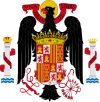
The Falange Española de las Juntas de Ofensiva Nacional Sindicalista was a fascist political party founded in Spain in 1934 as merger of the Falange Española and the Juntas de Ofensiva Nacional-Sindicalista. FE de las JONS, which became the main fascist group during the Second Spanish Republic, ceased to exist as such when, during the Civil War, General Francisco Franco merged it with the Traditionalist Communion in April 1937 to form the similarly named Falange Española Tradicionalista y de las JONS.

The Movimiento Nacional was a governing institution of Spain established by General Francisco Franco during the Spanish Civil War in 1937. During Francoist rule in Spain, it purported to be the only channel of participation in Spanish public life. It responded to a doctrine of corporatism in which only so-called "natural entities" could express themselves: families, municipalities and unions. It was abolished in 1977.
Falangism was the political ideology of two political parties in Spain that were known as the Falange, namely first the Falange Española de las Juntas de Ofensiva Nacional Sindicalista and afterwards the Falange Española Tradicionalista y de las Juntas de Ofensiva Nacional Sindicalista. Falangism has a disputed relationship with fascism as some historians consider the Falange to be a fascist movement based on its fascist leanings during the early years, while others focus on its transformation into an authoritarian conservative political movement in Francoist Spain.

The Falange Española Tradicionalista y de las Juntas de Ofensiva Nacional Sindicalista, frequently shortened to just "FET", was the sole legal party of the Francoist regime in Spain. It was created by General Francisco Franco in 1937 as a merger of the fascist Falange Española de las JONS with the monarchist neo-absolutist and integralist Catholic Traditionalist Communion belonging to the Carlist movement. In addition to the resemblance of names, the party formally retained most of the platform of FE de las JONS and a similar inner structure. In force until April 1977, it was rebranded as the Movimiento Nacional in 1958.

Gabriel Arias–Salgado Montalvo was a Spanish politician of Falangist ideology, who held positions during the Franco dictatorship.
The term Alfonsism refers to the movement in Spanish monarchism that supported the restoration of Alfonso XIII of Spain as King of Spain after the foundation of the Second Spanish Republic in 1931. The Alfonsists competed with the rival monarchists, the Carlists, for the throne of Spain.

The Nationalist faction or Rebel faction was a major faction in the Spanish Civil War of 1936 to 1939. It was composed of a variety of right-leaning political groups that supported the Spanish Coup of July 1936 against the Second Spanish Republic and Republican faction and sought to depose Manuel Azaña, including the Falange, the CEDA, and two rival monarchist claimants: the Alfonsist Renovación Española and the Carlist Traditionalist Communion. In 1937, all the groups were merged into the FET y de las JONS. After the death of the faction's early leaders, General Francisco Franco, one of the members of the 1936 coup, headed the Nationalists throughout most of the war, and emerged as the dictator of Spain until his death in 1975.
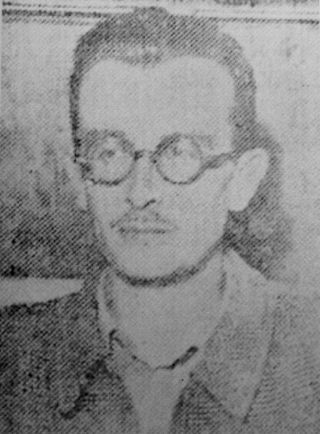
José María de Oriol y Urquijo, 3rd Marquis of Casa Oriol (1905–1985) was a Spanish entrepreneur and a Carlist and Francoist politician. During early Francoism a mayor of Bilbao, he is known mostly for his business activity, especially for his role in the Spanish energy industry, TALGO train development and the banking sector. He is counted among the most influential Spanish business managers of the 20th century.
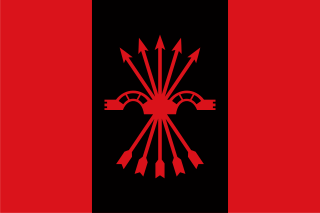
Falange Española de las JONS is a Spanish political party registered in 1976, originating from a faction of the previous Falange Española Tradicionalista y de las Juntas de Ofensiva Nacional Sindicalista. The word Falange is Spanish for phalanx. Members of the party are called Falangists. The main ideological bases of the party are national syndicalism, Third Position and ultranationalism.

Falange Española Independiente was a Spanish political party registered in 1977, originating from the Frente de Estudiantes Sindicalistas (FES), a student group of anti-Francoist falangists.

Movimiento Falangista de España is a Spanish political party registered in 1979. The party considers itself heir of classic Falangism, openly rejecting Francoism, originating from a split of the Círculos Doctrinarios José Antonio, led by Antonio Jareño. Currently the party only has activity in Cantabria.
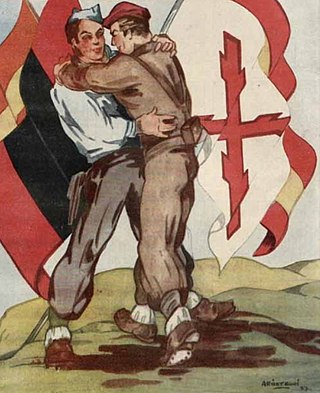
The Unification Decree was a political measure adopted by Francisco Franco in his capacity of Head of State of Nationalist Spain on April 19, 1937. The decree merged two existing political groupings, the Falangists and the Carlists, into a new party - the Falange Española Tradicionalista y de las Juntas de Ofensiva Nacional Sindicalista. As all other parties were declared dissolved at the same time, the FET became the only legal party in Nationalist Spain. It was defined in the decree as a link between state and society and was intended to form the basis for an eventual totalitarian regime. The head of state – Franco himself – was proclaimed party leader, to be assisted by the Junta Política and Consejo Nacional. A set of decrees which followed shortly after appointed members to the new executive.
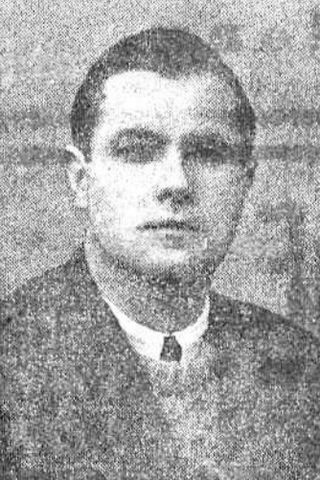
Jesús Elías Francisco Elizalde Sainz de Robles (1907–1980) was a Spanish Carlist politician. He served in the Cortes in two separate strings: during the Second Republic in 1936 and during Francoism in 1954-1958. In 1938-1939 he was a member of Junta Política of Falange Española Tradicionalista, and in 1954-1958 he was a member of FET's Consejo Nacional. In 1942-1944 he headed the regional Carlist Navarrese organization. Politically he sided with the Carlist branch which opted for conciliatory policy towards the Franco regime and leaned towards a monarchist dynastical alliance.
The Movimiento Español Sindicalista (MES) was a Spanish far-right political movement and predecessor of the Falange Española.
The history of the far-right in Spain dates back to at least the 1800s and refers to any manifestation of far-right politics in Spain. Individuals and organizations associated with the far-right in Spain often employ reactionary traditionalism, religious fundamentalism, corporate Catholicism, and fascism in their ideological practice. In the case of Spain, according to historian Pedro Carlos González Cuevas, the predominance of Catholicism played an essential role in the suppression of external political innovations such as Social Darwinism, positivism, and vitalism in Spanish far-right politics.
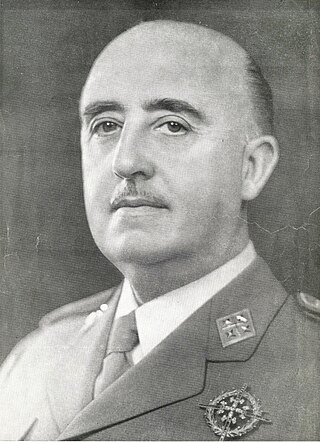
Carlo-francoism was a branch of Carlism which actively engaged in the regime of Francisco Franco. Though mainstream Carlism retained an independent stand, many Carlist militants on their own assumed various roles in the Francoist system, e.g. as members of the FET y de las JONS executive, Cortes procuradores, or civil governors. The Traditionalist political faction of the Francoist regime issued from Carlism particularly held tight control over the Ministry of Justice. They have never formed an organized structure, their dynastical allegiances remained heterogeneous and their specific political objectives might have differed. Within the Francoist power strata, the carlo-francoists remained a minority faction that controlled some 5% of key posts; they failed to shape the regime and at best served as counter-balance to other groupings competing for power.
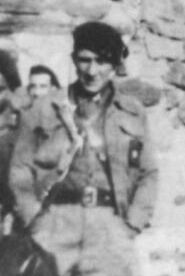
José María Mazón Sainz (1901–1981) was a Spanish lawyer and a Traditionalist politician. In the early 1930s he was active within Carlism and rose to party leader in the province of Logroño. Engaged in the coup of July 1936, during the Spanish Civil War he favored unification into the state party. His political career climaxed at the turn of the decades; in 1937–1938 he held a seat in the first Falange Española Tradicionalista executive Junta Política and in 1937–1942 during two first terms he was member of another top party structure, Consejo Nacional. In return, he was expulsed from Comunión Tradicionalista. In the early 1940s he withdrew from politics and led a Madrid law firm.
The Vice-Secretariat for Popular Education was an internal body of FET y de las JONS existing during the early stages of the Francoist dictatorship in Spain. It took over press and propaganda duties in the country from 1941 up until its dissolution in 1945.
Libertad was a Spanish newspaper published in Valladolid between 1931 and 1979. Originally founded by the fascist leader Onésimo Redondo as a weekly of fascist, pro-Nazi and anti-Semitic ideology, during the Civil War it became a daily newspaper. It continued to be published until its disappearance in 1979, after the end of the Franco regime.

The Servicio Exterior de Falange, sometimes known simply as the "Falange Exterior", was an organism of the Falange España Tradicionalista y de las JONS, the single party of the Franco regime. It was in charge of coordinating the actions of the various Falange delegations that existed outside Spanish territory.
